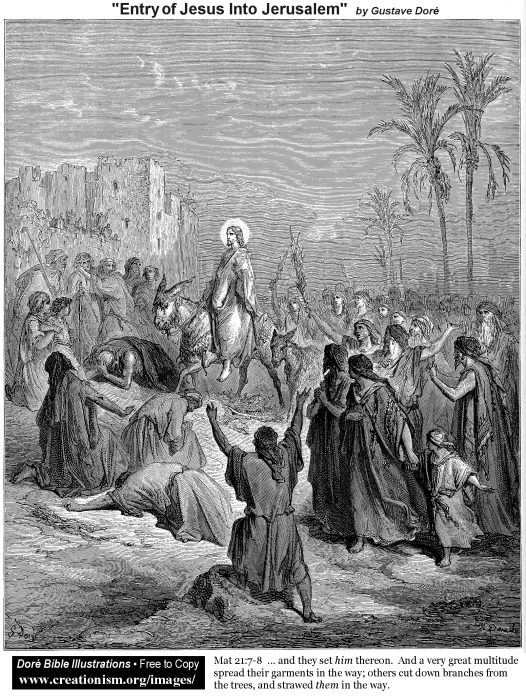 "Rejoice greatly, O daughter of Zion! Shout in triumph, O daughter of Jerusalem! Behold, your king is coming to you; He is just and endowed with salvation, Humble, and mounted on a donkey, Even on a colt, the foal of a donkey. I will cut off the chariot from Ephraim And the horse from Jerusalem; And the bow of war will be cut off. And He will speak peace to the nations; And His dominion will be from sea to sea, And from the River to the ends of the earth." (Zech. 9:9-10)
"Rejoice greatly, O daughter of Zion! Shout in triumph, O daughter of Jerusalem! Behold, your king is coming to you; He is just and endowed with salvation, Humble, and mounted on a donkey, Even on a colt, the foal of a donkey. I will cut off the chariot from Ephraim And the horse from Jerusalem; And the bow of war will be cut off. And He will speak peace to the nations; And His dominion will be from sea to sea, And from the River to the ends of the earth." (Zech. 9:9-10)
While preparing for Sunday's message on the "Triumphal Entry" of Jesus Christ, I came across this great quote, which refers to Matthew 21:4-5:
It is noteworthy that Matthew, in explaining the need of a literal colt for the King's entry, is careful to restrict his quotation to only the first part of Zechariah's prophecy. Verses 9-10 of Zechariah 9 form one continuous prophecy joined by the conjunction "and." Verse 9 tells the manner of the King's arrival, while verse 10 tells what the King will do when His beneficent reign is established. Then the "chariot," the "battle bow" and the war "horse" will be cut off; He will "speak peace unto the nations: and his dominion shall be from sea to sea, and from the River to the ends of the earth" (ASV). Not one of these details of Messiah's reign in verse 10 is even mentioned by Matthew. Writing both by divine inspiration and from the vantage point of known history, Matthew knew that the King had arrived and also that the King had not occupied His Messianic throne. If the colt ridden by the King upon His arrival had to be literal, so also must the warfare be literal which will be abolished when He reigns. If Matthew had believed in a "present Messianic reign" ushered in by the first coming of the King, here would have been the time and place to cite in full the details of Zechariah 9:9-10, but He says not a word about the wondrous things of verse 10. (Alva McClain, The Greatness of the Kingdom, p. 347)We see something similar in Luke 4, where Jesus stands up in the synagogue and reads from Isaiah 61:1-2a, which He says has been fulfilled in their hearing, during His first advent. But He shuts the scroll and does not read the rest of the prophecy, which mentions vengeance, and pertains to Christ's future, second coming.

1 comment:
Interesting. I had not noticed what Matthew didn't quote.
"He will proclaim peace to the nations. His rule will extend from sea to sea and from the River to the ends of the earth." Zac. 9:10
I do see McClain's argument from the silence of Matthew that this is a prophecy of the eternal kingdom.
Post a Comment